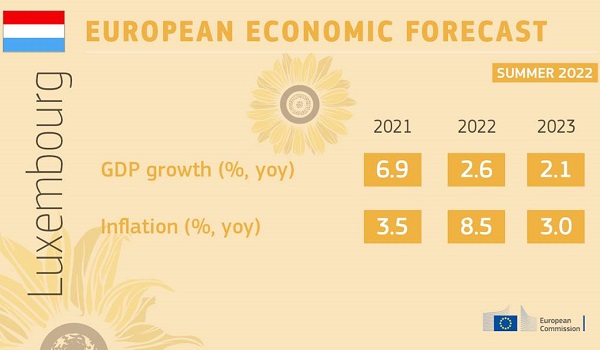 Credit: European Commission
Credit: European Commission
In its "Summer 2022 Economic Forecast", the European Commission has estimated that the Luxembourg economy will slow to 2.6% in 2022.
Luxembourg's latest macroeconomic forecast
After registering strong growth of 6.9% in 2021, Luxembourg's real GDP growth is expected to slow down to 2.6% in 2022, despite a robust first quarter (1.2% quarter-on-quarter), mainly driven by private consumption and net exports. Although consumers' sentiment has weakened and high inflation is forecast to persist, private consumption is expected to remain resilient and to grow over the forecast horizon, supported by a still dynamic labour market, savings accumulated during the pandemic and fiscal support schemes to households and firms put in place in the context of high energy prices.
The uncertain external environment and the tightening of financial conditions are set to weigh on investment growth. In particular, investments in equipment and construction are expected to decelerate. The contribution of the financial sector to growth is projected to decrease in 2022, mainly on the back of a deterioration in the stock market environment.
EU economy
Russia's war of aggression against Ukraine continues to negatively affect the European Union (EU) economy, setting it on a path of lower growth and higher inflation compared to the Spring 2022 Forecast. The Summer 2022 (interim) Economic Forecast projects that the EU economy will grow by 2.7% in 2022 and 1.5% in 2023. Growth in the euro area is expected at 2.6% in 2022, moderating to 1.4% in 2023. Annual average inflation is projected to peak at historical highs in 2022, at 7.6% in the euro area and 8.3% in the EU, before easing in 2023 to 4.0% and 4.6%, respectively.
Many of the negative risks surrounding the Spring 2022 Forecast have materialised. Russia's invasion of Ukraine has put additional upward pressures on energy and food commodity prices. These are feeding global inflationary pressures, eroding the purchasing power of households and triggering a faster monetary policy response than previously assumed. Ongoing deceleration of growth in the United States (US) is adding to the negative economic impact of China's strict zero-COVID policy.
The EU economy remains particularly vulnerable to developments in energy markets due to its high reliance on Russian fossil fuels, and weakening global growth detracts from external demand. Momentum gathered with the rebound of last year and a somewhat stronger than previously estimated first quarter is set to prop up the annual growth rate for 2022. Still, economic activity in the remainder of the year is expected to be subdued, notwithstanding a promising summer tourism season. In 2023, quarterly economic growth is expected to gather momentum, on the back of a resilient labour market, moderating inflation, support from the Recovery and Resilience Facility and the still large amount of excess savings.
Overall, the EU economy is set to continue expanding, but at a significantly slower pace than expected in the Spring 2022 Forecast.
Valdis Dombrovskis, Executive Vice-President for an Economy that Works for People, commented: "Russia's war against Ukraine continues to cast a long shadow over Europe and our economy. We are facing challenges on multiple fronts from rising energy and food prices to a highly uncertain global outlook. We are fortunate to be starting from a position of strength, having weathered through the previous crisis with a solid return to growth. Economic growth will slow markedly in the second part of this year but gain more traction in 2023. In view of high inflation and tightening financing conditions, it will be important to find the right balance between moving towards a more prudent fiscal stance and protecting the most vulnerable. We should also reduce our dependence on Russian fossil fuels".
Paolo Gentiloni, European Commissioner for Economy, added: "Russia's unprovoked invasion of Ukraine continues to send shockwaves through the global economy. Moscow's actions are disrupting energy and grain supplies, pushing up prices and weakening confidence. In Europe, momentum from the reopening of our economies is set to prop up annual growth in 2022, but for 2023 we have markedly revised down our forecast. Record-high inflation is now expected to peak later this year and gradually decline in 2023. With the course of the war and the reliability of gas supplies unknown, this forecast is subject to high uncertainty and downside risks. To navigate these troubled waters, Europe must show leadership, with three words defining our policies: solidarity, sustainability and security".








